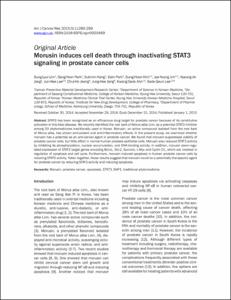Morusin induces cell death through inactivating STAT3 signaling in prostate cancer cells
- Keimyung Author(s)
- Jang, Jung Hee
- Department
- Dept. of Pharmacology (약리학)
- Journal Title
- American Journal of Cancer Research
- Issued Date
- 2015
- Volume
- 5
- Issue
- 1
- Abstract
- STAT3 has been recognized as an efficacious drug target for prostate cancer because of its constitutive activation in this fatal disease. We recently identified the root bark of Morus alba Linn. as a potential STAT3 inhibitor among 33 phytomedicines traditionally used in Korea. Morusin, an active compound isolated from the root bark of Morus alba, has shown anti-oxidant and anti-inflammatory effects. In the present study, we examined whether morusin has a potential as an anti-cancer agent in prostate cancer. We found that morusin suppressed viability of prostate cancer cells, but little effect in normal human prostate epithelial cells. Morusin also reduced STAT3 activity by inhibiting its phosphorylation, nuclear accumulation, and DNA binding activity. In addition, morusin down-regulated expression of STAT3 target genes encoding Bcl-xL, Bcl-2, Survivin, c-Myc and Cyclin D1, which are involved in regulation of apoptosis and cell cycle. Furthermore, morusin induced apoptosis in human prostate cancer cells by reducing STAT3 activity. Taken together, these results suggest that morusin could be a potentially therapeutic agent for prostate cancer by reducing STAT3 activity and inducing apoptosis.
Keywords: Morusin, prostate cancer, apoptosis, STAT3, SHP1, traditional phytomedicine
- Keimyung Author(s)(Kor)
- 장정희
- Publisher
- School of Medicine
- Citation
- Sung-Lyul Lim et al. (2015). Morusin induces cell death through inactivating STAT3 signaling in prostate cancer cells. American Journal of Cancer Research, 5(1), 289–299.
- Type
- Article
- ISSN
- 2156-6976
- Appears in Collections:
- 1. School of Medicine (의과대학) > Dept. of Pharmacology (약리학)
- 파일 목록
-
-
Download
 oak-aaa-00124.pdf
기타 데이터 / 1.84 MB / Adobe PDF
oak-aaa-00124.pdf
기타 데이터 / 1.84 MB / Adobe PDF
-
Items in Repository are protected by copyright, with all rights reserved, unless otherwise indicated.